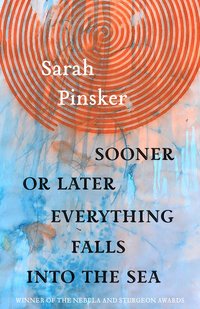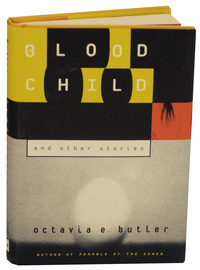Our first guest post in 2019 by a contemporary writer comes from Sarah Pinsker, whose debut collection of science fiction and fantasy stories, Sooner or Later Everything Falls into the Sea, is published today by Small Beer Press.

Pinsker’s short fiction has already won a Nebula Award and a Theodore Sturgeon Memorial Award, making Sooner or Later Everything Falls into the Sea one of the most anticipated science fiction debuts of recent years. The collection’s thirteen stories touch on road trips and space ships, AI and emigration, among other themes, and its protagonists include punk rockers, time travelers, anarchists, and a fiddle-playing astronaut. Kirkus Reviews calls the book “an auspicious start to what promises to be one wild ride of a literary career,” and novelist Karen Joy Fowler has said that “each story is generous and original. . . . Pinsker has emerged as one of our most exciting voices.”
In the following column, Pinsker draws back the curtain on some of the writers and works that have been key influences on her fiction.
Molly Gloss, Hearts of Horses. In this novel about a young woman who arrives in a small Oregon community to train horses, Gloss lays bare the lives of those settled in the American west of the early twentieth century. Mario Vargas Llosa wrote that we read to live other lives that we wouldn’t get to experience otherwise, and I felt like I had a few more lives in me after reading this book. The two things I aspire to most when I read Gloss’s books and stories, and this one in particular, are her note-perfect narrative voice and the way her historical details feel not just real but lived.
Gene Wolfe, The Fifth Head of Cerberus. The Fifth Head of Cerberus is composed of the title story and two linked novellas, all set on the sister planets of Sainte Anne and Sainte Croix, each with a different tone and focus but a common question: What really happened to Sainte Anne’s aboriginal inhabitants? The second is called “‘A Story,’ by John V. Marsch,” and is ostensibly told by the anthropologist who appears as a side character in the first story and is the subject of the third. The three are intricately balanced, and each made me want to go back and reread the previous for clues that I had missed. The tone of the stories is serious, but there’s a playfulness with form and content that I find delicious.
Ursula K. Le Guin, The Left Hand of Darkness. Based on what I knew of the novel before I read it, I had imagined that gender was going to be the all-important theme, but I really found it to be secondary to a lot of other topics, chief among them patriotism, alienness, and alienation. Beyond any talk of themes, it’s a moving story of the relationship between two people as they struggle to survive and communicate; and isn’t that one of the most basic stories we tell? It’s a road-trip book and an odd-couple book, two of my favorite tropes to play with.
James Tiptree Jr., Her Smoke Rose Up Forever. In story after story, Tiptree shows she is willing to put humankind up to the most unflattering of mirrors. If beauty or joy is found, it is fleeting. I tend to see a little more hope in humanity, but I find Tiptree’s prose dangerous and intense, and her ideas electric. I particularly love “The Man Who Walked Home” and “Houston, Houston, Do You Read?” for the tragedies hidden at their core, slowly and expertly unraveled by the author.

Octavia Butler, Bloodchild and Other Stories. Butler says in the intro that she’s not a natural short fiction writer, which blows my mind, because these stories are exquisite. “Speech Sounds,” “Bloodchild,” and “The Evening and the Morning and the Night” are all among the best stories I’ve ever read: uncomfortable, uncompromising, and thought-provoking.
Sherwood Anderson, Winesburg, Ohio / Ray Bradbury, Something Wicked This Way Comes. I sometimes pair Winesburg, Ohio and Bradbury’s Something Wicked This Way Comes as a particular kind of small-town portrait, each macabre and grotesque in its own ways. Anderson’s men are better realized than his women, and his language is euphemistic and formal, but at the same time, the interior lives of the characters feel rich and lived. Almost every story captures one of the townspeople at a moment of internal crisis: stay or go? stay silent or scream? follow your urges or your conscience? Each of these moments feels accurate and true. Even though the vignettes are only loosely connected, they tell an overarching tale of choices made.
Many of my early experiences with Bradbury involved his fix-up or mosaic novels, stories loosely stitched into the frameworks of The Illustrated Man and The Martian Chronicles, which helped prepare me to read the similarly-structured Winesburg, Ohio. In Something Wicked This Way Comes, Bradbury is in novel mode, telling the eerie tale of two young boys and one creepy carnival. This is the first book that I remember noticing for its prose, and for the ways it stepped back and looked at people, at friendship, at fear, at strangers and strangeness.
Vonda McIntyre, Dreamsnake. I love Snake as a character: she is good at what she does and she is comfortable in her own skin. I also love that this book is not your typical post-apocalyptic nightmare. It takes place so long after a nuclear catastrophe that society has rebuilt itself, albeit in a very different form. This lets McIntyre present us with a familiar but somewhat alien landscape, advanced and regressive technology, humans acting human but according to slightly different societal rules, all with lots of room to explore. I try to do that in my stories as well, as simple as it sounds: writing humans acting human even in extreme circumstances.
Woody Guthrie, Bound for Glory. This is Guthrie’s autobiography, covering his childhood in Oklahoma and his travels by train and by foot, always with a guitar on his back. Through entirely unintentional circumstances, I wound up reading it for the first time on a long train trip, and I’ve since recommended it to everyone I know who is taking such a journey. It was also the first time I remember seeing that it was possible to conjure music in prose, as he writes about “singing something with fight and guts and belly laughs and power and dynamite to it,” a lesson I took to heart.
Sarah Pinsker’s fiction has been published in Asimov’s Science Fiction, Strange Horizons, Lightspeed, The Magazine of Fantasy & Science Fiction, and Uncanny, among other outlets, and in numerous anthologies. She is also a singer/songwriter with three albums on various independent labels and a fourth she swears will be released someday soon. Pinsker lives in Baltimore with her wife and dog and her first novel, A Song for a New Day, will be published by Berkley in September 2019.



